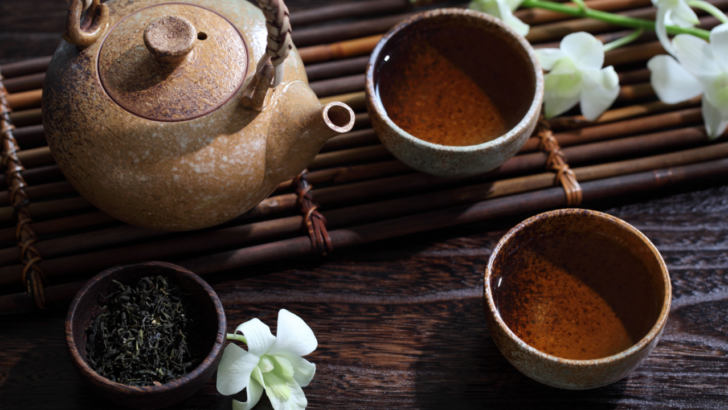Blackberry leaf tea is a nice herbal remedy for many common ills. There’s nothing like a cozy, warm cup of tea when you’re feeling off or want to proactively add some extra vitamin C and iron to your diet. Packed with antioxidants and bacteria-fighting properties in every leaf, the tea can be a great addition to a daily routine.
And the best part is that it can be made from homegrown (or forest-grown) blackberry plants (rubus fructicosus) from simply plucking the leaves. You can then make the blackberry leaf tea yourself with only a handful of ingredients.
How to Harvest Blackberry Leaves for Tea
The good news is that you can just pick the leaves straight from the blackberry plant. The bad news is that some leaves (especially the bigger ones) have little prickly spines on them. It is a good idea to wear gloves (these long sleeve gloves would work perfectly) when harvesting your blackberry leaves.
Simply pluck the leaves and shoots from the plant. Pinch the prickly little spines off the leaves. Younger leaves often have fewer pokies, so you should try to pluck them while they are still fresh and tender.
How to Preserve Blackberry Leaves
While you can dry blackberry leaves by just dehydrating them or drying them in a shaded, cool spot, blackberry leaves are best preserved through fermentation processes. This helps to bring out the flavor and retain the medicinal benefits in the leaves. It is important to note here that the fermenting process can take a long time, so it is best to start the process as soon as possible after harvesting.
To ferment the leaves:
- Using a rolling pin or similar utensil, crush and pound the leaves to release the juices
- Pack the leaves into a glass jar and seal tightly
- Place the jar in a very warm area for two weeks (for optimal results, six weeks is recommended)
- Remove leaves and finish the drying process in an oven at a low temperature or a dehydrator until crunchy
- Rub the leaves through a wire sieve or wire mesh to a more traditional size of tea leaf
- Store the tea leaves in an airtight, press-seal jar and in a cool and dry place
- After the process is done, you can take it one step further if you’d like and pre-make tea bags using one heaping teaspoon per sachet. These premade bags should also be stored in a cool and dry place until you are ready to make blackberry leaf tea.
Making Blackberry Leaves Tea
If you are storing your own leaves for tea, a blackberry leaf tea is really simple to make.
You can also modify and change this base recipe to add in other blends (raspberry and lemon balm are hits, but also adding calendula petals can give an extra medicinal boost) or any sweeteners like honey or sugar.
The only ingredients are 1 heaping teaspoon of blackberry leaves and water.
This blueberry tea is delicious too!
Benefits of blackberry leaf tea
Blackberry leaf tea has some medicinal properties that make it a handy thing to keep around. Traditionally, this type of tea is used to soothe some effects of sore throat, mouth ulcers, and sore gums.
Tea made from blackberry leaves also has astringent qualities that help with the production of mucus linings in your organs used for digestion. That means it can help with digestive issues (such as diarrhea) and gastrointestinal inflammation as well.
Plus, it’s been known to help regulate menses (a woman’s period) and help with low iron (anemia).
What does blackberry leaf tea taste like?
This tea is rather tame in flavor as far as herbal teas go. There is an overall mild, fruity taste, but it can also be quite bitter, though not to the point of being undrinkable. If you prefer a less bitter drink, you can add honey or sugar, or even a few of the blackberries.
What else can you do with blackberry leaves?
Blackberry leaves can also be used in poultices to treat external inflammation and soreness. Poultices are soft, moistened masses of plant material (in this case, blackberry leaves) that are applied to the skin. These poultices are kept in place with a cloth and help reduce the effects of inflammation and soreness.
If you want to collect the stems or thorns of the blackberry leaves, you can weave baskets or make fishing lures, respectively.
FAQ
Can blackberry leaves be used for tea?
Yes! Blackberry leaf tea is a great drink if you enjoy tea and provides many additional health benefits. The fermented and dried leaves have a bunch of bacteria-fighting properties and antioxidants in them, making them a great remedy for a common sore throat or gums, and mouth ulcers.
Is it safe to eat blackberry leaves?
Leaves from the Rubus Fructicosus are edible raw or can be boiled or steamed to add to soups or served as a vegetable. It is important to note here that the young leaves are the best to consume, as they have fewer thorns and are softer. However, if you want to eat them, check for all the little spines before ingesting or cooking.
Does blackberry tea help with diarrhea?
Yes, a blackberry leaf tea can help with a lot of gastrointestinal issues, including diarrhea. The astringent properties of the tea help to tonify the mucus membrane and lining of digestive organs and reduce inflammation.
Does blackberry leaf tea have caffeine?
The blackberry plant does not contain any caffeine on its own, but when combined into a blend, there may be caffeine depending on your plant mixture.
Are blackberry leaves good for skin?
You can make a poultice from blackberry leaves that are safe to use externally on the skin to combat inflammation or soreness. Consuming blackberry leaves can increase your skin’s firmness and elasticity by boosting collagen production, giving blackberry leaves an anti-aging benefit.
How do you dry blueberry leaves for tea?
To dry blueberry leaves to use for tea, first crush the leaves to remove the juices. You can put the leaves in the oven on low heat or in a dehydrator to speed up the process. Otherwise, you can keep the leaves in a cool, dry place and dry them like any other herb.
Can blackberries be poisonous?
Nope, blackberries are not poisonous, nor do they have any poisonous look-alikes. So you can forage to your heart’s content in the wild and know that blackberries are a safe and dependable berry to consume. However, it is a good idea to practice caution and brush up on your plant identification. If you are unsure if something is an edible berry, be safe instead of sorry and do not consume it.
What do blackberry leaves look like?
Blackberry leaves have 3 to 5 leaflets around a central ridge. The mature leaves are dark green in color with white fuzz on the surface. New shoots will have purple-colored leaves. Blackberry leaves have a row of thorns along the central ridge on the underside of the leaf.



Carlo M.
Monday 11th of December 2023
Thank you for this article. I have grown my own Blackberries for years but have never used the leaves to make a tea. I plan to do so in my next growing season. It seems like every year I discover more uses for my Blackberries.
Rebecca
Tuesday 27th of December 2022
The tagline mentions you can make the tea with fresh or dried leaves, but the article only talks about using dried/fermented. Can you make the tea with fresh leaves? And if so, is the process any different? Great article— thank you!
Adriana
Tuesday 27th of December 2022
Rebecca, absolutely! You can make the tea with fresh leaves. The fermenting/drying process gives the tea a taste similar to black tea. Give it a try: I think you'll like it. It'll b a bit tart, and you can adjust the strength by the amount of time you steep the leaves.
Iryna
Friday 9th of September 2022
Hi Adriana, I really enjoyed your article and would appreciate some help. I have spent significant amount of time to collect large amount of blackberry leaves. Unfortunately, after just a couple of days of fermentation they have developed a white furry mold. What shall I do? Is it safe to consume or better just throwing it away? To prevent this happens in future haw often shall I take my leaves out of the jar and pull them apart during 6 weeks fermentation period? Thank you in advance.
Adriana
Saturday 10th of September 2022
I would definitely throw away the moldy batch and start over. Make sure you place your leaves in a dark place, and yes, you can prevent molding by fluffing up your leaves to take them apart every day in the beginning and less often as time goes by. Also, smell your leaves: depending on your environment, they can ferment as soon as a few days, and you'll smell the earthy smell when they are ready.
Easy Blueberry Tea Recipe
Wednesday 11th of August 2021
[…] Love berry teas? Try this blackberry leaf tea. […]
Easy To Make Blackberry Drop Dumplings
Wednesday 7th of July 2021
[…] you’re enjoying blackberries this season, pick some leaves and dry them for making blackberry tea later […]